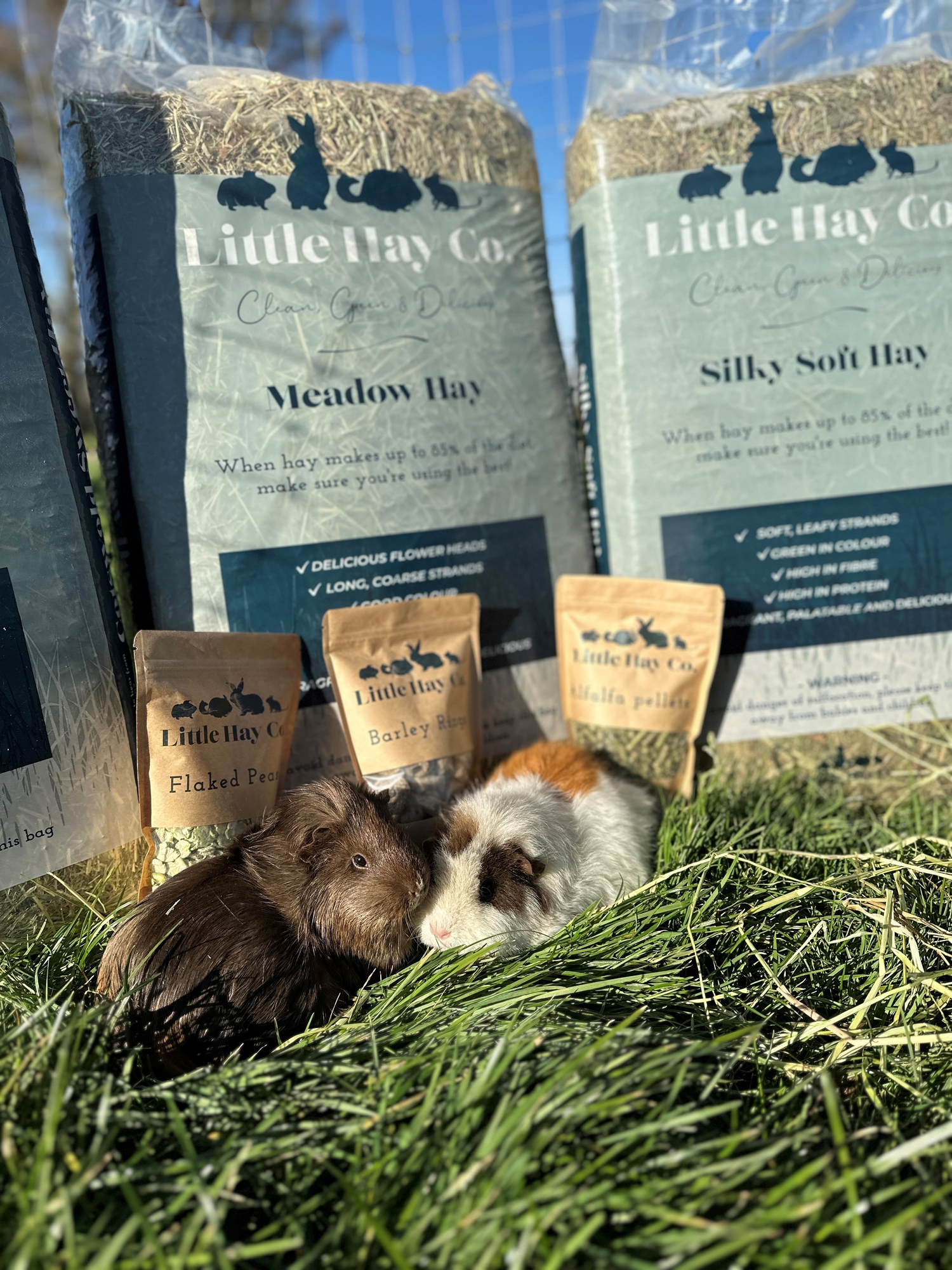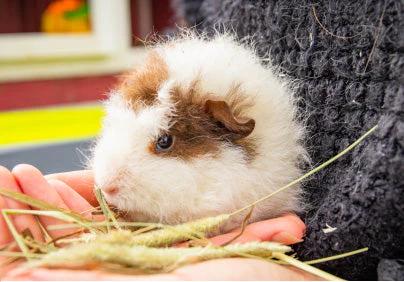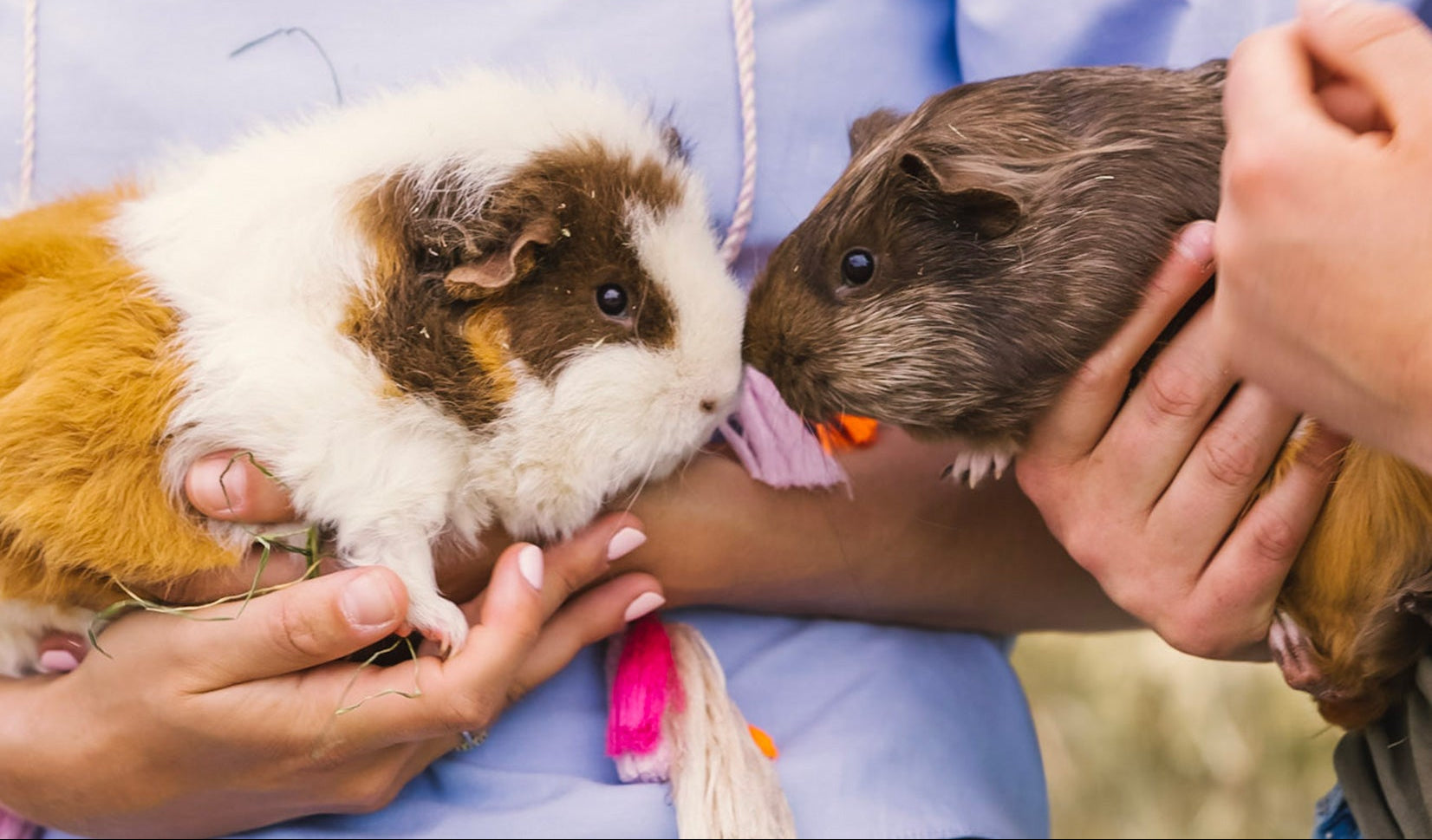As the new year begins, many of us are making resolutions to improve our health and well-being. But what about our furry friends? Have you considered making a resolution for your rabbit or guinea pig's health? One simple and effective way to do this is by introducing a second hay variety to their diet. This can help encourage hay intake and provide them with a more diverse and nutritious diet.
Why is hay important for rabbits and guinea pigs?
Hay is an essential part of a rabbit or guinea pig's diet. It provides them with the necessary fiber to maintain a healthy digestive system and prevent dental problems. In fact, hay should make up the majority of their diet (around 80%), with fresh vegetables and a small amount of pellets as supplements. However, some rabbits and guinea pigs can be picky eaters when it comes to hay, which can lead to nutritional deficiencies and other health issues.
Although hay based products are lovely, they should not be fed as a replacement for hay, they should only be used as a treat.
Introducing a second hay variety
If you're worried about your pet's hay intake, introducing a second hay variety can be a game-changer. Not only does it provide them with a different taste and texture, but it also adds variety to their diet, making mealtime more exciting for them. This can help stimulate their appetite and encourage them to eat more hay.
Choose from a wide range of hay varieties
When it comes to choosing a second hay variety, there are plenty of options to consider let's take a look through the hay varieties we stock at Little Hay Co to help you make a choice on your pets NEW favourite hay!
Pure Canadian Timothy Hay is high in fibre, providing essential nutrition for a healthy diet. It's long in strand and coarse so great for digestion and teeth maintenance in pets.
Available in 1kg and 2kg hand packed boxes to guarantee freshness and quality.
✓ Premium quality
✓ Fuller, rougher flower head
✓ High in fibre
✓ Green in colour
✓ Fragrant and delicious for your pets
We do our best at the point of packing to send out the best quality possible however this is a dry hay and some shatter is to be expected during transportation.
Timothy is popular main stay hay and can appease the appetite of the fussiest of furry friends. As timothy hay is high in fibre and low in calcium it is the perfect choice for a balanced diet. It can be mixed in with our other hays to provide variety.
We cut our Pure Timothy hay once in a year, to ensure the best cut with the right blend of nutrients, roughage and flavour.
Product qualities:
✓ Premium quality
✓ Fuller, rougher flower head
✓ High in fibre
✓ Green in colour
✓ Fragrant and delicious for your pets
Our Meadow Hay is made from quality seed grass.
It is a mixture of Timothy, Rye and Fescue Grasses, ideal for variety and tastiness.
It is made in the field in the traditional way and so although it is still tasty and good enough to eat, it is a lower quality hay than our other varieties and is often used for bedding and is great to play in.
This is a perfect, cost effective choice for your small hay eating pet working out at just £2 per kilo making it our most cost effective offering.
Rabbits and pets who like a course cut Timothy hay may like this hay as a cheaper alternative.
Guinea pigs and smaller animals would be better suited to the Silky soft or Cotswold Sweet hays due to their softer/finer nature.
Product qualities:
✓ High Quality
✓ Good for teeth maintenance
✓ compacted bales
✓ Good in colour
✓ Offers variety for your pets
Classic Cotswold Sweet Hay long in strand and green in colour, ideal for digestion and teeth maintenance in your pets; it is high in protein, making this pack ideal for maintaining a healthy diet without increasing the chances of obesity. Our Cotswold Sweet Hay was previously called Rye Grass Hay, if you have ordered our Rye Grass Hay in the past this is the product you need to re order.
Product qualities:
✓ Premium Quality
✓ Good for teeth maintenance
✓ High in Protein
✓ Green in colour
✓ Sweet & Fragrant for your pets
Silky Soft
Our Silky Soft Hay is a good all round Hay. It is a very sweet smelling blend of Hays that small pets love to nibble and because it is super silky and soft it also makes comfortable and cosy bedding hay. If eye-poke is a concern, this is the perfect Hay for you.
Our silky soft hay is a combination of Timothy, Rye Grass and Fescue - similar to our meadow hay! The thing that sets our silky soft apart is the grass has been cut earlier in the season before the strands are fully formed which gives it a soft touch and silky appearance.
Our Guinea pigs, Posey and Clover love this hay and so do many of our brand reps. It is a great part of a balanced diet for guinea pigs, rabbits and other small animals. It is also good for burrowing, hiding and playing in.
Product qualities:
✓ Premium Quality
✓ Perfect for smaller pets
✓ Great for nibbling and making a cosy bed
✓ Green in colour
✓ Sweet & Fragrant for your pets
A new addition to Little Hay Co. Alfalfa is a legume (similar to clover) which makes it slightly different to a traditional hay as it is a lot more leafy with a mix of crunchy strands.
Alfalfa is high in calcium and protein to support healthy growth and development. It is best suited to young (up to 6 months old) or lactating pets who require the extra calcium, also suitable for those recovering from illness who need a boost. Once your pet is matured or recovered then transitioning onto a grass hay is recommended. Alfalfa is rich in fibre and promotes optimal digestion for your pet.
How to introduce a new hay variety
When introducing a new hay variety, it's important to do so gradually. Start by mixing a small amount of the new hay with their current hay and gradually increase the proportion over time. This will allow your pet to adjust to the new taste and texture without upsetting their digestive system.
Remember to monitor your pet's hay intake and make sure they are eating enough. If you notice any changes in their behavior or appetite, consult with a veterinarian.













